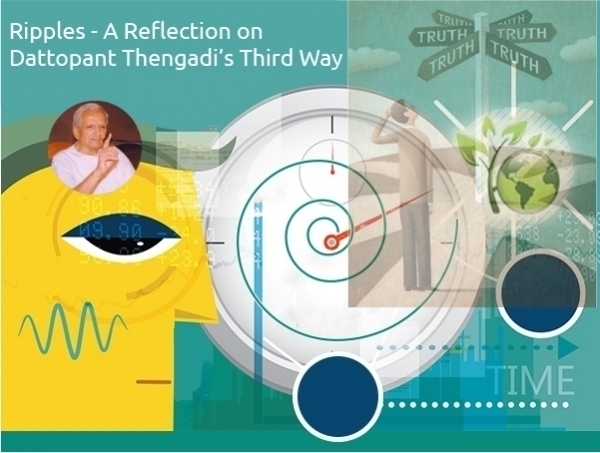Ripples: A Reflection On Dattopant Thengadi's Third Way - Part 15
15 Mar 2022 10:45:24
I have been reflecting in my own way on Dattopant Thengadi Ji's Third Way. I present these small "ripples" that it has caused in my mind in a series. I am glad it has found its resonance in many thinking minds alike. I hope the readers have read the earlier article in the series before moving ahead.

Also Read: Ripples: A Reflection On Dattopant Thengadi's Third Way - Part 14
Dattopant states that the ideology of communism doesn't seem to provide the solutions to the problems faced by people. Of course, they are struggling to overcome self-contradictions. Capitalism too is trying to seek remedies for the ever-emerging problems. Many theories are presented in this period of history to explain and understand the problems emerging due to challenges thrown by the new situations. Many new experiments ( socialism is one of the known examples) started, new solutions were sought.
When the western picture of economic theories and concepts related to them emerges in the writing of Dattopant, he refers to many perspectives and theories developed by leading economists of the west. They discuss the roles of the State, the market and its impact on society. How they fare and where they fall short of explaining and solving the problems. He notes that in spite of best brains invested, Capitalism as a theory could not help developing a social order which would take care of all the aspects of a society. There are many contradictions in these theories and so are bound to destroy the third world countries. And of course damage mankind ultimately.
Many have pointed out this fact in books written. Stefan o Zamagani acknowledges that economics being a social science, it doesn't deal with nature ,so doesn't have laws which are truly universal in nature. Such laws can explain and predict future events. In the absence of such laws possibility of explanation using generalisations is restricted by 'local and temporal limits'. Social sciences take a longer time to get some theory even being considered for testing.
Economists have limitations and policy makers have even greater limitations. Dattopant suggests that as Communism and Capitalism are known to be falling short of expectations it is the ' historic obligation' to present the way out based on Sanatan Dharm.
Economists have limitations and policy makers have even greater limitations. Dattopant suggests that as Communism and Capitalism are known to be falling short of expectations it is the ' historic obligation' to present the way out based on Sanatan Dharm.
Of course the world of Christianity and Islam too are working in this direction. Dattopant makes one observation that Mohammad , the prophet, is a founder and a law giver too. Lord Jesus is not a law giver, though there are references to anarchy and corruption. Islamic text has concepts like interest-free economy. Of course it is not an easy task to evolve a socio-economic order inconsistency with such concepts. But they are really working on the system.
Obviously, we need to fearlessly acknowledge that a non-western pattern is to be developed which would be in consistency with the culture of the society. Thus the models developed in west may not coherent outside Europe. They are 'not the universal models of progress and development' . ( Claude Alvares)
( It is really interesting to read various references given by Dattopant related to many economic theories and the concepts in the book. Probably it is to be discussed in an independent lecture series.)